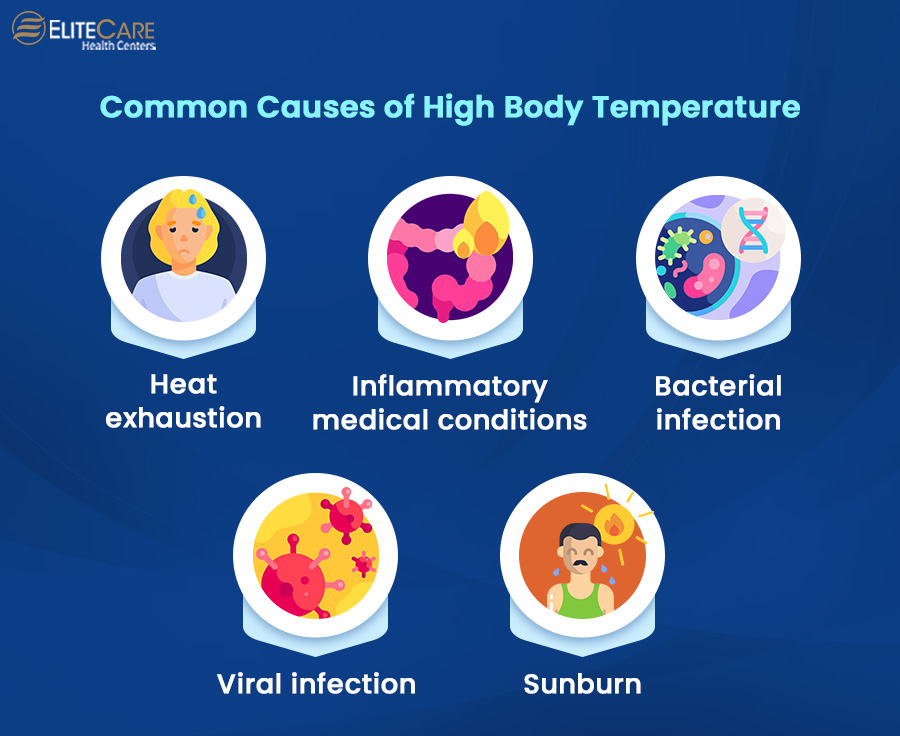
Have you ever wondered why your body feels hot and cold sometimes or why your temperature rises when you’re sick? Body temperature is a crucial indicator of your health and understanding it can help you stay healthy and identify potential issues, including the need for senior care services.
Contrary to popular belief, the normal body temperature range is not a fixed number of 98.6°F. Adult body temperature can vary between 97°F to 99°F, and several factors can cause differences in body temperature.
This blog post will debunk the “perfect” temperature myth and investigate the reasons behind temperature fluctuations. Additionally, it will also throw light on the different types of fever and the illnesses and conditions that can cause them. Let’s get started.
Normal Body Temperature Range
To understand the significance of body temperature in assessing our health, it is important to establish what is considered a normal range. Let’s explore the truth behind the commonly misunderstood “normal” body temperature concept.
The Myth of 98.6°F Temperature
Many people hold the belief that a standard body temperature is 98.6°F (37°C). However, recent research has cast doubt on this notion. The 1800s study that established this value had a limited sample size, rendering it potentially inaccurate as a representation of “normal” body temperature for all individuals.
Adult Body Temperature Range is Between 97°F to 99°F
Within the adult population, body temperature typically falls between 97°F (36.1°C) and 99°F (37.2°C). It’s worth noting that slight variations in body temperature can still be considered within the normal range.
Factors That Can Cause Differences in Body Temperature
Several variables contribute to variations in body temperature, including age, gender, time of day, and activity levels. Women may experience slight temperature elevation during ovulation and pregnancy, while older adults, who may benefit from tailored senior care services, might have a slightly lower body temperature.
Moreover, physical exertion and external factors, such as exposure to extreme temperatures, can influence body temperature. Establishing an understanding of an individual’s personal normal body temperature is crucial, as significant deviatio ns may indicate an underlying health concern. In case of any irregularity in temperature, immediately consult trusted primary care physicians.
Read More: types of preventive care to ensure healthy life for seniors
High Body Temperature: Fever
When the body temperature increases, it is referred to as a fever. Fevers can be categorized as either low-grade or high-grade. Let’s explore the distinctions between these two types.
Low-Grade Fever
A body temperature ranging from 99°F to 102.2°F typically falls into the category of a low-grade fever. Low-grade fever can be a symptom of many illnesses, including respiratory, ear, and urinary tract infections. These infections usually last 3 to 7 days, and the fever typically disappears as the infection resolves.
High-Grade Fever
A high-grade fever, on the other hand, is a condition where the body temperature rises above 102.2°F. This often indicates that the immune system is fighting off an infection. In such cases, a fever can be a good thing as it is the body’s way of getting rid of the harmful pathogen.
Other Factors that Can Cause High Body Temperature

Aside from infections, several other factors can cause high body temperature. These include:
1. Heat Exhaustion
Heat exhaustion occurs when the body overheats due to exposure to high temperatures, and the body cannot regulate its temperature. This can lead to symptoms such as fatigue, weakness, nausea, and muscle cramps. Heat exhaustion can progress to heatstroke, a serious medical condition that requires immediate medical attention.
2. Medical Conditions Causing Inflammation or Increasing Metabolism
Certain medical conditions, such as autoimmune diseases, inflammatory conditions, and some cancers, can cause a high body temperature due to inflammation. Also, hyperthyroidism, a condition where the thyroid gland produces too much thyroid hormone, can increase metabolism and lead to a high body temperature.
3. Sunburn
Sunburn can also cause a high body temperature, especially in severe cases. The skin becomes inflamed, and the body’s temperature increases as the immune system tries to repair the damage.
Low Body Temperature
A body temperature below the normal range of 97°F to 99°F is considered low. When body temperature falls below 95°F, it is considered abnormally low, also known as hypothermia. This is a medical emergency that requires immediate treatment.
Causes of Low Body Temperature
1. Exposure to extreme cold
Exposure to cold temperatures for extended periods can cause the body’s temperature to drop rapidly, leading to hypothermia. It can occur in cold water, snow, or during outdoor activities in chilly weather. The elderly are more vulnerable to hypothermia, as their bodies have difficulty generating and retaining heat.
2. Medical conditions like an underactive thyroid or spinal cord injury
Medical conditions such as an underactive thyroid or spinal cord injury can also cause low body temperature. Hypothyroidism, or an underactive thyroid, can slow metabolism, leading to a drop in body temperature. Spinal cord injuries can affect the body’s ability to regulate temperature, leading to hypothermia.
If you or someone you know is experiencing symptoms of hypothermia, such as shivering, confusion, slurred speech, or loss of coordination, seek immediate medical attention. Keeping the person warm and dry is important until medical help arrives.
When to Seek Medical Care
- Any significant change in body temperature should be taken seriously. Extremely high or low body temperature should be treated as a medical emergency and requires immediate attention.
- If you experience changes in weight, appetite, or pain along with changes in body temperature it may be a sign of an underlying medical condition. It is important to seek medical attention, including primary services, to determine the cause and receive appropriate treatment. Sometimes, online doctor consultation can be a convenient option for seeking medical advice and guidance, especially for non-emergency situations; you can avoid the visit to a medical clinic in this way.
- Monitoring other vital signs and body temperature is crucial for maintaining overall health. Regular blood pressure, weight, heart rate, and respiratory rate monitoring can help detect abnormalities and provide timely medical intervention.
Read More: importance of preventive care for senior citizens
The Bottom Line
Body temperature is an essential vital sign that provides insight into an individual’s health status. Regular body temperature monitoring can help detect abnormalities and prevent serious health complications.
EliteCare Health Centers specializes in comprehensive healthcare services for seniors, focusing on preventative care and chronic disease management. However, they do not provide emergency care services. If you require immediate medical assistance or are experiencing a medical emergency, please contact your local emergency services or visit the nearest emergency room.
For non-emergency medical needs, EliteCare is here to provide personalized, high-quality care. Schedule an appointment today to receive the dedicated attention and comprehensive healthcare services you deserve.






